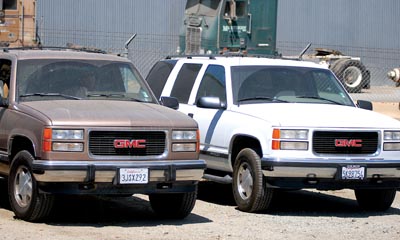
The U.S. government will shut down its cash-for-clunkers program
at 8 p.m. EDT Monday, in a bid to avoid car dealers and shoppers
from claiming more than the $3 billion set aside for the
program.
By Justin Hyde, Detroit Free Press
The U.S. government will shut down its cash-for-clunkers program at 8 p.m. EDT Monday, in a bid to avoid car dealers and shoppers from claiming more than the $3 billion set aside for the program.
The decision means that the program originally expected to generate 250,000 vehicle sales over three months will have likely triggered more than 700,000 in less than one month. While it accomplished its goal of destroying gas guzzlers and spurring the U.S. auto industry to boost production, its larger effects on the economy and environment will be debated for years to come.
“This program has been a lifeline to the automobile industry, jump starting a major sector of the economy and putting people back to work,” said U.S. Transportation Secretary Ray LaHood. “At the same time, we’ve been able to take old, polluting cars off the road and help consumers purchase fuel efficient vehicles.”
But the program has proven so popular that the Obama administration has struggled to keep its growth in check, pushing an emergency $2-billion extension through Congress earlier this month when the plan burned through its original $1 billion in about a week.
The National Automobile Dealers Association had warned dealers Wednesday of a rising chance that the program could run out of money unexpectedly, leaving dealers on the hook for vouchers of $3,500 or $4,500 per sale.
As of Thursday afternoon, the U.S. Department of Transportation said $1.9 billion of the money has been claimed so far through 457,000 transactions, but estimated dealers are likely sitting on an additional $400 million in deals that have yet to be submitted. The Monday deadline includes some buffer to absorb any surge of last-minute deals this weekend.
The deadline applies only to generating new deals; the government will continue processing the deals turned in for some time, and dealers will have chances to correct any transaction kicked back by the government. NADA and several dealers have said the government was slow to wire money from the program; General Motors Co. said Wednesday it would advance cash to dealers while they waited for their clunker payments.
The government had set aside $50 million to run the program, but now estimates the costs will come closer to $100 million, leaving $2.9 billion available. In recent days the U.S. Department of Transportation had boosted the number of people processing clunker deals to 1,200.
GM, Ford Motor Co. and other automakers have boosted production for the remainder of the year mostly in response to the clunkers program. GM sales chief Mark LaNeve said today that the company’s sales have run 60,000 vehicles ahead of its plan over the last two months, mostly due to clunkers.
As of last Friday, GM was the second-largest beneficiary of the clunkers plan among automakers, claiming 17.6 percent of sales to Toyota Motor Co.’s 18.9 percent. Detroit automakers had started to run so short of some car models that the government allowed dealers to turn in pre-orders of new vehicles that would be delivered later.
The typical cash-for-clunkers deal involved an older model SUV or truck from a Detroit automaker traded in for a car that was more likely to come from a foreign automaker than a domestic one. The federal government said the new vehicles typically improved on the fuel economy of the clunker by more than 9 miles per gallon.








